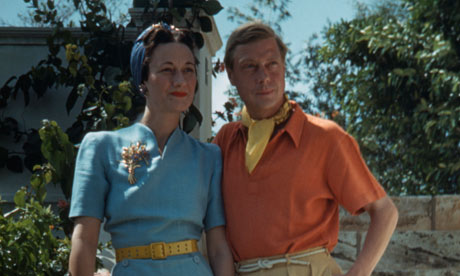
Mrs Wallis Simpson is everywhere. Writers, playwrights and film-makers are in hot pursuit. She is encountered on a golf course in the Oscar-winning The King's Speech (and we overhear Prince Edward's besotted late-night phone call to her). She appears as a tragic figure in Hugo Vickers's exposé Behind Closed Doors. She is absurdly travestied in Madonna's recent film WE, and is the subject of a sympathetic new biography, That Woman, by Anne Sebba. And she is at the eerie centre – an absentee presence – of Nicholas Wright's superb new play, The Last of the Duchess (just opened at Hampstead theatre), based on Caroline Blackwood's book about Simpson's fearsome octogenarian lawyer who guarded the duchess from all-comers. It seems that there was a beckoning emptiness about Wallis Simpson that is a continuing enticement to writers.
Kate Auspitz is a distinguished political historian – an Oxford Fulbright fellow with a Harvard PhD – and her contribution, Wallis: My War, is a debut novel that is not altogether fictional. It could even, she has said, be read as an "alternative history", and yet there has been much sport in its making. It is erudite, subversive, with lots of deadpan jokes. It could not have been written by a non-historian. Nor has it been written by a born novelist. It is a brittle hybrid.
Auspitz's ingenious theory is that the marriage between Wallis Simpson and the Duke of Windsor was engineered by the intelligentsia, who wished to save Britain from a Nazi king (Edward's fascist leanings were a potential liability). Simpson fails to become queen but succeeds as a pawn. The abdication is a bloodless coup. The novel is presented as a memoir, written by Wallis and "found in her former Paris home". It comes with scholarly endnotes – Auspitz the historian commenting on the "memoir" – a tricky idea. Like tent pegs, the endnotes hold a flyaway structure in place (an irritant if what you want is uninterrupted narrative).
There are authentic photographs too. In the most chilling, Simpson graciously extends her hand – and warmest smile – to Hitler. Auspitz is in her sprightly element describing Simpson's reaction to the Nazis. Wallis forms a particularly low opinion of Hitler, commenting on his lack of magnetism. She goes on to fail him as a vegetarian (the lack of green salad). The Nazis promise to secure her the throne but she is underwhelmed: "The Nazis really did make my head ache, and I didn't want to be Queen of England with Göring pawing my thigh."
Throughout, there is a tension between Simpson's light frivolity (although she is no fool) and the weight of destiny. For her, fashion matters, politics do not: wardrobe before cabinet. And yet, in a far-fetched development, it is Simpson's dress code – in the truest sense of "code" – that brings about the Normandy landings. Auspitz is good on the personal effects – in particular, her over-the-top jewels. Simpson judges men as if they were accessories too. But the novel's most powerful moments involve handsome Count Galeazzo Ciano because Wallis seems genuinely to have loved him. She wanted to do far more than pin him on her lapel.
A historian must always be tempted to rewrite history, and Auspitz has found a witty, blameless way of doing it. But I would have liked even more imaginative licence, more psychological depth and fewer facts. It would be interesting to understand more about Simpson's relationship with the Duke of Windsor which, here, is no more than a litter of insults. "It finally hit me. What was it going to be like being married to a child of 40," she wonders. It is one of the many things that in this thin, dry, playful novel we never find out.

